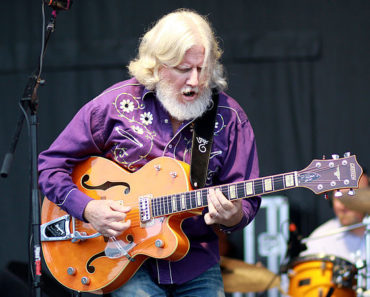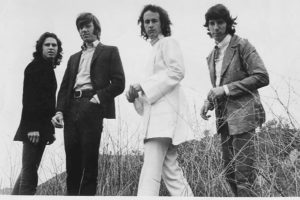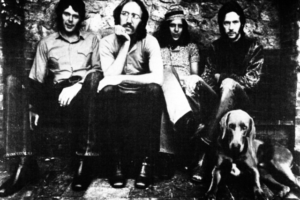
Our Top 10 Clyde McPhatter Songs list presents the best Clyde McPhatter Songs like “A Lover’s Question,” “Treasure of Love,” and many more. Without Clyde McPhatter, where would rhythm and blues be today? How about rock and roll between the classics and what’s playing today? McPhatter’s high pitch tenor voice was enough to influence listeners from all walks of life to at least try and imitate the man’s gospel-like performance. At one point in his career, he was the lead tenor from the R&B group Billy Ward and his Dominoes. He later formed his own group, The Drifters, before going solo.
Humble Beginnings
Born on November 15, 1932, in Durham, North Carolina, he was the son of Reverend Baptist George McPhatter. Since the age of five years old, he sang in his father’s church choir along with his siblings. At ten years old, Clyde was a soloist in the choir that sang in a soprano voice.
Going into 1945, the McPhatters moved to Teaneck, New Jersey. While there, Clyde was a student at Chelsior High School, as well as a part-time grocery clerk. Upon graduation, he was promoted to shift manager and worked there full-time. When the family picked up and moved to New York City, Clyde formed his own gospel group, the Mount Lebanon Singers.
After McPhatter won the Amateur Night at Harlem’s Apollo Theater contest in 1950, he humbly returned to the grocery store as its store manager. However, he was later approached to join Billy Ward and his Dominoes. Together, they recorded and released the hit single, “Sixty Minute Man.”
Domino Effect
As a member of Billy Ward and his Dominoes, Clyde McPhatter enjoyed the prestige that came as one of the top R&B vocal groups in the United States. What made them even more popular than groups like The Clovers and the Ravens was McPhatter’s high-pitched tenor vocals. Because of this, many recording artists were inspired to copy an art form he already perfected. Artists such as Marv Johnson, Ben E. King, Smokey Robinson, and Sammy Turner were among some of the top vocalists that fashioned themselves after McPhatter.
What kept McPhatter apart from the rest who seemed to follow his queue as a vocalist was his ability to bring the house down as a singer who could merge the very soul of gospel and R&B music together as one musical entity. This newfound popularity in music served as a source of inspiration that would inspire up-and-comers to copy yet another successful formula McPhatter also perfected.
As a member of Billy Ward’s Dominoes, McPhatter was instrumental in the group’s success until 1953. While part of the group, he didn’t earn much as a performer. Instead of being able to capitalize on the fame so he could at least keep up with the cost of daily living, he found himself in a situation where he needed to embark in a more profitable direction.
It also didn’t help when Clyde McPhatter’s lyrical talent was often credited to Clyde Ward or as Billy Ward. He also found himself at odds with Ward which would ultimately give him cause to cut ties and move on. Ward agreed to McPhatter’s decision to leave but only if he would coach a replacement. This was how Jackie Wilson took McPhatter’s place as the group’s new lead tenor. Wilson himself became a big fan of Clyde McPhatter, recognizing him as his key source of influence as he propelled his own career.
Drifting On
Now with Billy Ward and his Dominoes behind him, Clyde McPhatter moved forward by forming the Drifters. This first lineup was singers McPhatter already performed with as Mount Lebanon Singers. In 1953, this new group recorded “Lucille,” a song McPhatter wrote. Unfortunately for the Drifters, the label they were with at the time, Atlantic Records, didn’t have what the executives were looking for at the time. As a result, McPhatter had to replace the lineup with new singers.
First as Clyde McPhatter and the Drifters, “Money Honey” and “Such a Night” were released as singles. Then as The Drifters featuring Clyde McPhatter, the group recorded and released “Honey Love” and “White Christmas.”
After this, McPhatter was sent to the U.S. Army in 1954 and was assigned to Special Services. While serving inside the continental states of the nation, this allowed the man to continue recording. When his tour of duty was finished, he left the Drifters to pursue a musical career as a soloist.
Despite McPhatter’s departure, the Drifters were able to continue as a successful group but with a completely brand new lineup than what McPhatter had before he left. Despite their success, McPhatter had already sold his share of the group to the band’s manager at the time, George Treadwell. This was a decision he later regretted after he realized this left his fellow musicians unable to profit from the tremendous success the Drifters achieved for themselves.
On His Own
Immediately after he was discharged from the military, Clyde McPhatter recorded and released his first hit as a solo artist. It was a duet with Ruth Brown titled “Love Has Joined Us Together.” Shortly after this, he recorded additional notable R&B songs such as “Rock and Cry” and “Seven Days.”
This success led to additional hit singles that would be recorded and released, including “A Lover’s Question” and “Treasure of Love.” It was while still with the Atlantic Records label he earned his first gold record, which was awarded to him by the Recording Industry Association of America.
After his run with Atlantic Records was over McPhatter signed up with MGM Records. He released several more hit songs before moving on to Mercury Records. This successful run continued until “Lover Please” served as his final top ten hit single that would appear on the US Billboard music charts.
Misfortunes
Unfortunately for Clyde McPhatter, the tastes of the fans were changing as the 1960s progressed in a direction that forced R&B to share the spotlight with the various sounds coming from rock and roll music. Now facing a downward spiral in popularity as a recording artist, this prompted McPhatter to move to England in 1968 where he still had a loyal fan following. In an effort to maintain his popularity, he recruited British-based ICE to serve as his musical backup.
However, the move to England was short-lived as he returned to the United States in 1970. Although he made a few appearances in rock and roll revival tours, the rest of his days had him live a reclusive lifestyle. There was the hope of a big comeback after McPhatter signed up with Decca but as it turned out, fate had other ideas.
On July 13, 1972, at just thirty-nine years old, depression and alcoholism caught up with Clyde McPhatter that claimed his life. Despite his stellar career as one of the finest recording artists in the music industry, the mismanagement of his career by the people he trusted most left him struggling to make ends meet.
Clyde McPhatter Legacy
The influence of Clyde McPhatter as a singer turned him into an idol among an audience that recognized his contribution as the defining influence that merged R&B with the gospel-like soul. Unfortunately for McPhatter, he didn’t realize this at the time as he assumed at one point he didn’t even have a fan base. What was also unfortunate was not being able to live long enough to see how many fans he really had.
The Clyde McPhatter Club inducted the legendary R&B singer into the Rock and Roll Hall of Fame as a double and triple inductee. This was the name the members of the organization gave themselves as fans of Clyde McPhatter. He was the first recording artist to be inducted into that hall of fame twice. The first time was in 1987 as a solo artist, then in 1998 as a member of the Drifters. A year later, “Money Honey”
He was also recognized by the Rockabilly Hall of Fame as a pioneer of the music industry, as well as the mix of country and rock as its own genre. In addition to this, “Money Honey” was inducted into the Grammy Hall of Fame in 1999, a song McPhatter performed as the first big hit for the Drifters in 1953.
Ronald McPhatter, his son while he was in a relationship with Ruth Brown, currently tours with a group he named after his father, Clyde McPhatter’s Drifters. Through Ron, the legacy of Clyde McPhatter continues. Adding to this was the opening of Clyde McPhatter’s exhibit in the North Carolina Museum of History titled “The Beach Music Exhibit.” The collection of memorabilia it was donated by Clyde’s daughter, Deborah. This includes McPhatter’s induction to the North Carolina Music Hall of Fame which took place in 2009.
McPhatter was idolized by Black audiences as few singers before or since ever were, and for almost 15 years helped define rhythm & blues and its transformation into soul. In a way, he was the most improbable of R&B stars, a gentle high tenor who, superficially at least, seemed more suited to the angelic strains of gospel music. And his name gave some potential managers and agents pause — what kind of R&B singer, forget a star, was named Clyde? And Clyde McPhatter seemed like a backwoods burlesque of a Black American name. But when he sang, the doubts and the laughter all disappeared — even on his live album from the Apollo Theater, recorded during his declining years, when he describes physical lust in the hit “Ta Ta,” he makes it feel urgent and real, and utterly convincing.
Top 10 Clyde McPhatter Songs
#10 – Crying Won’t Help You Now
On the US Billboard Hot R&B/Hip-Hop Singles chart, “Crying Won’t Help You Now” peaked at number twenty-two. It was the final hit from Clyde McPhatter, which was released in 1965. Although this was a breakup song from a romance that went cold, it also served as a bit of a reality check when it came to McPhatter’s career as a recording artist. With R&B music taking a backseat to the new wave of styles that were dominating the charts, it painted an impression on artists like McPhatter that the fans abandoned him.
However, crying about it didn’t help, which McPhatter already knew. Still, the use of alcohol as a means to cope with his depression proved to be a demon too difficult to overcome. This ultimately led to medical conditions that would rob the world of a rare and awesome talent that seemed destined to make a big comeback.
Fans of Dee Dee Warwick may recognize her vocals singing in the background as McPhatter lyrically informed his love interest that her tears were no longer going to influence his decision making as a man ready to move on from what he felt was a toxic relationship.
https://www.youtube.com/watch?v=Jm6gsKpislE
#9 – Just To Hold My Hand
“Just To Hold My Hand: was a single released from Clyde McPhatter’s first solo album, Love Ballads. On the US Billboard Hot R&B/Hip-Hop Singles chart, it became a number-six hit. On the US Billboard Hot 100, it peaked as high as number twenty-six. This doo-wop number was a real gem as McPhatter inquired his love interest if she would allow him to hold hands. This was a great love song that may not have been a ballad but was certainly a catchy favorite that had no trouble winning over the fans, regardless of skin color.
#8 – Ta Ta
Recorded and released in 1960, “Ta Ta” became a number seven hit on the US Billboard Hot R&B/Hip-Hop Singles chart. On the US Billboard Hot 100, it became a number twenty-three hit. At this point, it was Clyde McPhatter’s highest-charting single as a solo artist. That changed in 1962 with “Lover Please,” which became McPhatter’s final top ten hits as a recording artist. “Ta Ta” was a playfully lustful song that had no trouble winning over the imagination of listeners as they’d turn up the music and take in McPhatter’s incredible vocals.
#7 – Long Lonely Nights
First, it was Lee Andrews & the Hearts who recorded and released “Long Lonely Nights” in 1957 before it was covered that same year by Clyde McPhatter. It was his version that became a hit, peaking as high as number one on the US Billboard Hot R&B/Hip-Hop Singles chart and at number forty-nine on the US Billboard Hot 100. Sung as a man with a broken heart, McPhatter’s performance was a hard act to follow, thanks to his wonderfully soulful performance.
There was also a Bobby Vinton version, which was released in 1965, that also became a solid hit on the US Billboard Hot 100 by peaking as high as number seventeen. This triggered a reality in artists like McPhatter that the audience was leaning more into pop-rock than R&B. However, the impression McPhatter left on his own audience served as a trigger point for upcoming stars of the 1960s to cover musical material like “Long Lonely Nights” that immortalized stars like him to become legends.
#6 – Love Has Joined Us Together (featuring Ruth Brown)
Right after Clyde McPhatter was discharged from the U.S. Army, he left his band, the Drifters, to pursue a solo career. His first hit single was “Love Had Joined Us Together,” a duet he performed with Ruth Brown in 1954. In 1955, it peaked as high as number eight on the US Billboard Hot R&B/Hip-Hop Singles chart. It was the first of many hit singles McPhatter recorded and released through the Atlantic Records label as a solo artist.
As a love song, “Love Has Joined Us Together” pointed out how the power of love is more than enough to overcome any obstacle. This song remains a classic among a fan base who are just as romantic at heart as the vocalists who performed it.
#5 – Lovey Dovey
Originally, “Lovey Dovey” was an R&B tune that was originally recorded by The Clovers in 1954. To date, it’s their version that remains the best known as it peaked at number two for five weeks on the US Billboard Hot R&B/Hip-Hop Singles chart. However, Clyde McPhatter’s version of this lighthearted address to his sweetheart was no slouch, either. His 1959 release of this single peaked at number twelve on the same chart, as well as at number forty-nine on the US Billboard Hot 100. His version was the first to appear on the pop chart, thanks to its boogie-woogie factor that made McPhatter’s music such a cult favorite.
#4 – Lover Please
Released in 1962, “Lover Please” was a song written by country artist Billy Swan that would become Clyde McPhatter’s final top-ten hit on the US Billboard Hot R&B /Hip-Hop Singles chart. It peaked as high as number four there while peaking as high as number seven on the US Billboard Hot 100.
Originally recorded by the Rhythm Steppers in 1960, “Lover Please” was a song McPhatter also turned into an international hit that saw its peak as high as number six in Norway. His influential performance inspired several recording artists to release their own versions. Thanks to McPhatter’s vocal performance, the plea made to his love interest to not leave him was genuinely heartfelt by the fans who loved his revolutionary brand of R&B music.
#3 – Seven Days
Clyde McPhatter’s “Seven Days” was a song released in 1956 that would later become a major hit for Tom Jones. This was a song sung as a lonely man who counted seven days had gone by without hearing from his love interest. Although credited on the music charts as a hit released by Clyde McPhatter & the Drifters by Atlantic Records, this song identified how much power he had as a vocalist who knew how to draw in a captivated audience. Upon his departure from The Drifters, it took the band five years before it could bounce back as a band.
On the US Billboard Hot R&B/Hip-Hop Singles chart, “Seven Days” peaked at number two. On the US Billboard Hot 100, it charted as high as number forty-four. By the time this song appeared on the music charts, McPhatter had already moved on as a solo recording artist. Atlantic Records released Clyde McPhatter & The Drifters as an album in 1954 that also featured the mega-hit singles, “Money Honey” and “Honey Love.” At that time, McPhatter was still with the Drifters. That changed after he came back from serving in the U.S. Army in 1955.
#2 – Treasure of Love
“Treasure of Love” became the first number-one hit on the US Billboard Hot R&B/Hip-Hop Singles chart credited to Clyde McPhatter and the Drifters after it was released in 1956. On the US Billboard Hot 100, it peaked as high as number sixteen. With over two million copies sold, it became certified gold by the Recording Industry Association of America. On the UK Singles Chart, this song peaked as high as number twenty-seven.
Although he wasn’t regarded as a solo artist at the time of the song’s initial recording, this peaked as a single after he already left the group. As far as the majority of the fans are concerned, this is McPhatter’s song. The influence of “Treasure of Love,” as performed by Clyde McPhatter, was immense. Several big-name recording artists performed versions of their own, as did McPhatter as a soloist.
#1 – A Lover’s Question
“A Lover’s Question” became the biggest hit that would further immortalize Clyde McPhatter as a recording artist. Released in 1958, it became a number-one hit on the US Billboard Hot R&B/Hip-Hop Singles chart and number six on the US Billboard Hot 100. The best-known version of this song was performed in mono, even though there was also a stereo version that was released as Atlantic History of Rhythm & Blues, Vol. 4. This song has also been included in other compilation albums from Atlantic Records over the years as the label paid homage to musical greats like McPhatter.
The influence of “A Lover’s Question” was immense. Between Ernestine Anderson’s 1961 coverage of this song to the country version performed by Del Reeves in 1970, it has popped in and out of the US Billboard music charts. As a testament, “A Lover’s Question” answered the call as a classic that’s as timeless as Clyde McPhatter’s legacy.
While “A Lover’s Question” may not share the same rate of success as “Money Honey,” it was still regarded as an all-time favorite by Clyde McPhatter after parting ways from the Drifters.
Feature Photo: General Artists Corporation/Marvin Drager, Public domain, via Wikimedia Commons
Top 10 Clyde McPhatter Songs article published on Classic RockHistory.com© 2022
Classicrockhistory.com claims ownership of all its original content and Intellectual property under United States Copyright laws and those of all other foreign countries. No one person, business, or organization is allowed to re-publish any of our original content anywhere on the web or in print without our permission. All photos used are either public domain creative commons photos or licensed officially from Shutterstock under license with ClassicRockHistory.com. All photo credits have been placed at the end of the article. Album Cover Photos are affiliate links and the property of Amazon and are stored on the Amazon server. Any theft of our content will be met with swift legal action against the infringing websites.



































